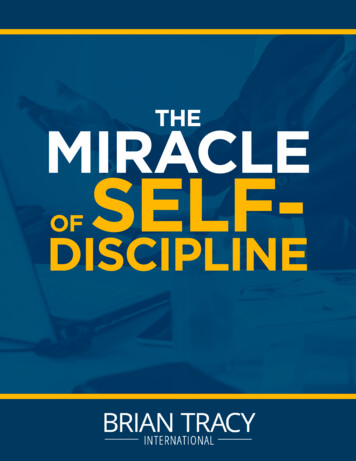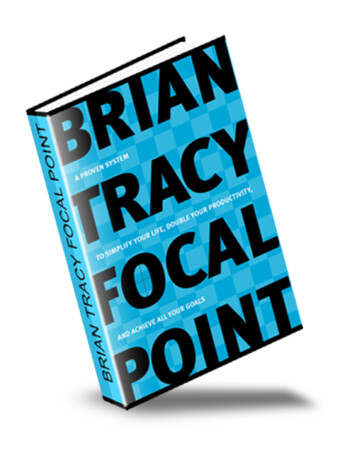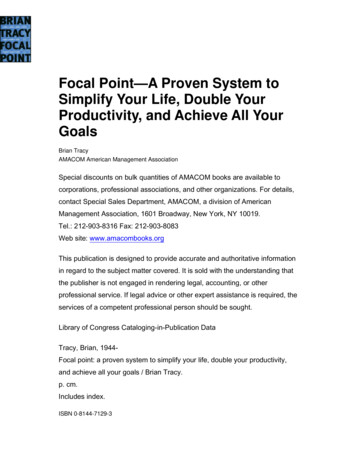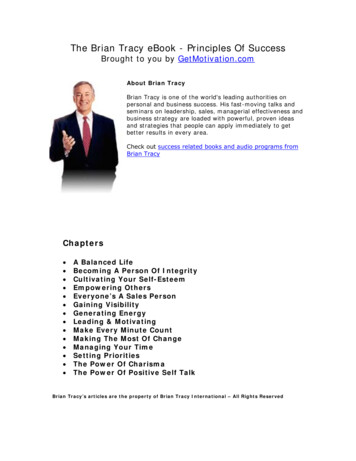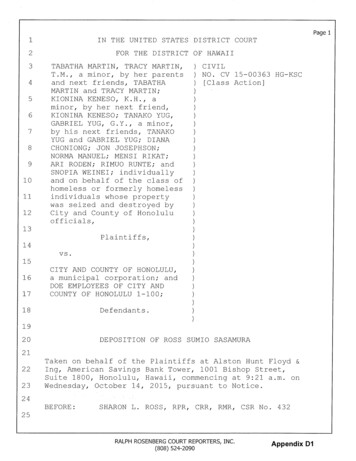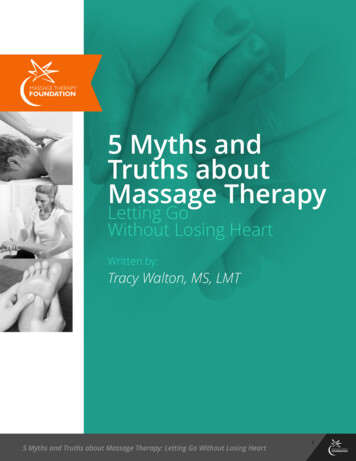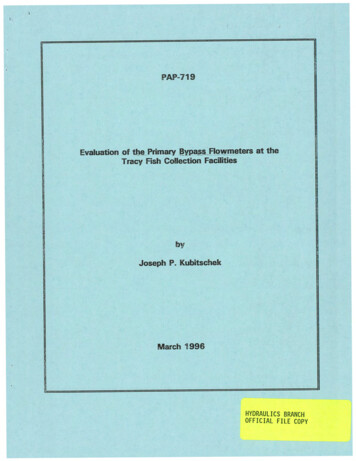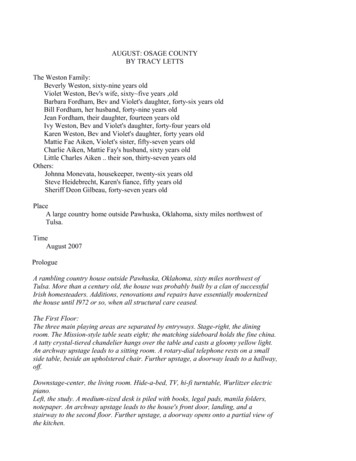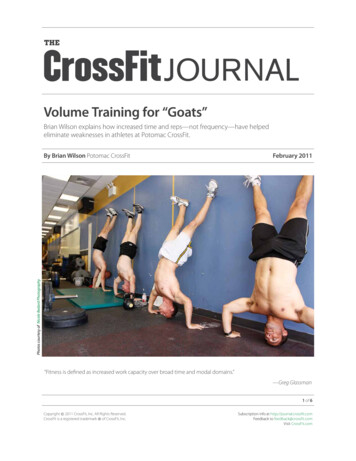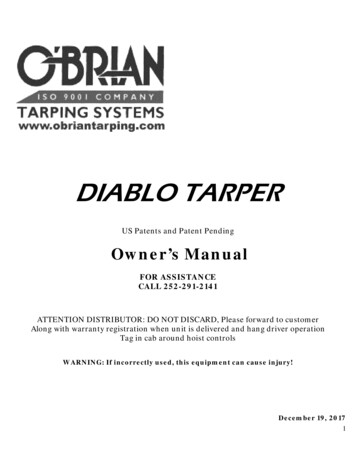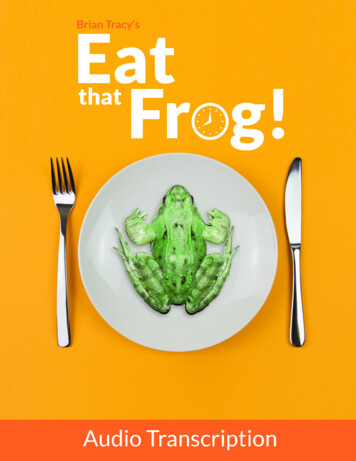
Transcription
BrianTracy’sEatFrg!thatAudioTranscription
TRANSCRIPTIONBRIAN TRACY’SEat That Frog!Hello, this is Brian Tracy and welcome to this program on Eat That Frog. In the time thatwe spend together you’re going to learn a whole series of practical ideas that you canuse to get more done faster and become more productive than ever before. I’m going to giveyou some of the best techniques in 30 years of working with some of the most productiveand highest paid people in the world. So let’s begin.Here’s the greatest breakthrough of all. Your results determine your rewards. In life, everybody wants to earn more money, they want to be more successful, they want to have a nicerhome, nicer car, more money in the bank, and no money worries. And the key is to learnhow to get more and better results.Now the interesting thing is that everybody has the same 24 hours per day. Some peopleuse that 24 hours per day in a remarkable way and get an enormous amount done. Otherpeople go through the day and get very, very little done. But at the end of the day, the mostimportant thing is the results that you got. After everything is said and done, nobody reallycares in the world of work how nice a person you are, how popular with other people, howcheerful and everything else, which are all helpful. All they care about is “Did you get thejob done? Did you get the most important jobs done? And did you get the jobs done thatyou are most responsible for in your work?” I’m going to show you how to do that.Now this eat the frog story comes from Mark Twain. Mark Twain once said that, “If thefirst thing that you do when you wake up in the morning is to eat a live frog, you’llhave the satisfaction of knowing that’s probably the worst thing that’s goingto happen to you all day long.”What it means is that your live frog is your biggest,ugliest task. It’s the worst thing that you have to do.It’s the one that you’re most likely to procrastinate on.And as you know, procrastination is not only the thief1To learn more about Brian Tracy, please visitwww.briantracy.com/AboutBrian. Brian Tracy. All rights reserved. The contents, or parts thereof, may not be reproduced in any form for any purpose without the written permission of Brian Tracy.
of life; it’s the thief of dreams. It actually leads to failure. Procrastination is a habit that hasbeen learned by procrastinating and you can relearn a new habit by overcoming procrastination and getting on with the job, which you’ll learn in the time we spend together.There are two corollaries to the rule about eating a live frog. First is if you have to eat morethan one frog, eat the ugliest one first. What this means is, do the worst first. Do the biggest, most difficult task first because that’s the one that makes most of the difference. Andthen once you’ve done your most important task, you’ll find that the whole day will flowmuch better.Corollary number two is, if you have to eat a frog at all, which we all have to do, it doesn’tpay to sit and look at it for too long. In other words, just do it. Get on with it. Make it thefirst thing that you do. We’ll loop back to this a little bit later.Now here’s an important point. You cannot manage time, you can only manage yourself.So time management is really life management. It’s really personal management. It’s reallythe management of the sequence of events in your life. It’s the ability to choose what youdo first, what you do second, and what you do later if at all. And in this ability to choose isyour entire life. When you choose the most important thing and you choose to do that first,and choose to do that rather than anything else, you immediately put your life onto the fasttrack. In fact, you can actually double your productivity, performance and output in one daysimply by changing your order of choices in the way you use your time.So what we’re talking about is not some abstract business concept; time management. We’retalking about life management and everything that happens to you in life. Everything thatyou do determines your success; it moves you toward your success or it moves you away.Everything counts.Double Your Productivity and Double Your Time Off!Do you feel overwhelmed? Do you feel like you have too muchto do with too little time to do it? You’re not the only one but, TIME is the one thing you can’t get back, so you mustlearn to maximize it! Click for more 2 Brian Tracy. All rights reserved. The contents, or parts thereof, may not be reproduced in any form for any purpose without the written permission of Brian Tracy.
Now the second principle that’s important is that you cannot save time. You can only spendtime differently. This is really important. You cannot save time because the time goes byinexorably and inevitably. It just tick and ticks. But you can spend it differently, and youcan spend it on higher value tasks.Some people earn ten dollars an hour and some people earn 100 an hour. What’s the difference? The difference is not intelligence, not ability, not natural talent; it’s just simply thathigher earning people spend their time on more valuable things. And we’ll talk about thisalso, as we go along.So let’s start talking about what we call “creative abandonment.” One of the great techniques I learned in time management is that you cannot get more done by working moreefficiently and effectively. You can’t create better and longer to-do lists and organize them.That’s not the key. The key is you’ve got to stop doing things.The only way you can get your time and life under control is you’ve got to stop doing thingsof lower value and focus on doing only a few things of higher value. If you’ll do that, everything will start to work for you.So we say that whenever you sit down in the morning and create a to-do list, you mustalso mentally create a not-to-do list. Sometimes you look at the items on your list and say,“Would it matter at all if this were done in the first place?” And if the answer is no, don’t doit, or at least don’t do it until the things that matter are done.Goethe the German philosopher once said, “The things that matter most must never be atthe mercy of the things that matter least.” We have to watch out for that.So, one of the most important words I learned when I started off studying time management30 years ago, is consequences. I’ve written books and sold millions of copies in 32 languages on every aspect of time management. I don’t even consider myself an expert. Thereare some people who define themselves as time management experts. I just consider it asubject that is essential for success and happiness, so I researched it.What I found was that something is important to the degree to which it has important consequences; high-potential, serious consequences. Something is unimportant to the degreeto which it does not have potential serious consequences.3 Brian Tracy. All rights reserved. The contents, or parts thereof, may not be reproduced in any form for any purpose without the written permission of Brian Tracy.
For example, choosing a course of study has high potential consequences because it mayaffect you for decades. Choosing the person that you marry, or the way that you treat yourwife or husband and your children has enormous impact on how they turn out and howtheir children and their children’s children turn out. Choosing the things that you do eachday has enormous consequences.So what you have to do is look at everything you do and say, “What are the consequences ofdoing or not doing this?” And if the consequences of not doing something are irrelevant,then don’t do it, and do the things that have serious immediate consequences. I’ll comeback and revisit this point because it’s really important.To get your time under control, to stop doing things and get yourself organized I suggest thatwhat you do is a KWINK analysis. KWINK stands for Knowing What I Now Know. This isa form of zero-based thinking where you zero-base all of your activities and decisions fromthe past and ask the following question: If I was not now doing this today, knowing what Inow know, would I start it up again today?This is a very important question because in times of turbulence like today, every single person you meet is in a zero-based thinking situation, including yourself. Everybody is doingthings today that, knowing what they now know, they wouldn’t start up again today.When you did start doing it at the time, it seemed like a good idea, given the informationyou had. But in retrospect, it has turned out to be not such a great idea at all. So you haveto ask yourself: is there anything that I’m doing today that, knowing what I now know, Iwouldn’t get into again today?And how can you tell if you’re in a KWINK situation? The answer is stress. Whenever youexperience ongoing, chronic stress over anything, or you think and worry about it constantlyand it causes you aggravation, it means that you’re in a bad situation.So here’s the rule: if your answer is, “No, I wouldn’t get into this situation again today,” thenthe next question is: how do I get out, and how fast? How can I discontinue this, and howquickly?Because once the answer comes up like the final numbers on a slot machine, “No, I wouldn’tget into this again,” then it’s already too late to save the situation. It’s over. It’s only a matter of time and suffering before you finally admit that you made a bad decision. So never4 Brian Tracy. All rights reserved. The contents, or parts thereof, may not be reproduced in any form for any purpose without the written permission of Brian Tracy.
be afraid to say, “I was wrong; I made a mistake. It seemed like a good idea at the time, butwith new information and experience, I realize I made a mistake.”One of great secrets to success, both in time and in life, is to cut your losses. Once you realize you’ve made a mistake, don’t throw good time and money after bad. Cut your losses.Double Your Productivity and Double Your Time Off!Do you feel overwhelmed? Do you feel like you have too muchto do with too little time to do it? You’re not the only one but, TIME is the one thing you can’t get back, so you mustlearn to maximize it! Click for more There are three areas where you can clear the decks of your life using a KWINK analysis.Number one is with regard to relationships. You’ll find that 80% of your problems or difficulties in life are associated with other people in some way. So you ask this question: isthere anybody that I’m involved with today, personally or in business, that knowing what Inow know, I wouldn’t get into this relationship again?If it is in your personal life, it is probably a major source of conflict, stress and unhappinessto be involved in a situation that knowing what you now know, you wouldn’t get into itagain today.If it is in your business life, very often it’s having hired, delegated or assigned something tosomebody. So I always ask managers: is there anyone working for you today who, knowingwhat you now know, you wouldn’t hire again today?I was talking with a group of managers just yesterday and posed this question. All aroundthe room people were nodding and smiling and every one of those managers was thinkingof someone or more than one person that, knowing what they now know, they wouldn’thire again. And it dons on them that this person is the source of most of their problemsand most of their stress. I also explain to managers that the reason they are keeping thisperson on is that he or she does a reasonably good job, is productive and maybe brings in5 Brian Tracy. All rights reserved. The contents, or parts thereof, may not be reproduced in any form for any purpose without the written permission of Brian Tracy.
sales, but the downside or negative contribution of a negative person in an organization isfar greater than their perceived contribution. When you finally bite the bullet and let go ofthat person, you’ll find that your sales will go up, productivity and moral will improve, andyou won’t really lose anything.The only reason we stay in a bad relationship, either business or personal, is that we thinkthat somehow we’re going to benefit more than the pain that it costs on the way through.And based on exhaustive research, you never really do. At the end of the day you’ll only sayone thing; “Why didn’t I end this a long time ago?”Now the reason I’m talking about a KWINK analysis is that if you have a major situation inyour life that is unresolved, what will happen is that it will foul up your time management,distort your thinking, and lower your productivity. You can’t really do open field runningin your life until you get into the clear, and you’ve got to get clear of the situations that arenow dragging you down.A second area of zero-based thinking the KWINK analysis has to do with is any businessprocess. With any sales or marketing or any product or service you are offering, you’ve gotto ask the question; Would I get into this again today, knowing what I now know? And ifthe answer is no, stop it now.Jack Welch wrote an article in Business Weekly and in it he said, “If there’s anything youwould do to save your business, should worse come to worst, don’t wait until then, do itnow. If there’s anything in the back of your mind that you know you should stop or get outof, do it now. Don’t wait until you have no choice.”The third area with regard to KWINK analysis has to do with investments. There are threecategories of investments: time, money, or emotions. Now, an investment of time is clear toall of us. You’ve invested a lot of time in a career, time in a relationship, time in a course ofstudy. And then one day you say to yourself, “That was not really a good choice of time.” Allthings considered, I spent a lot of time with that and it’s basically lost. But we humans havea terrible aversion to recognizing a loss of any kind. So recognize the loss. Cut your lossesand go on to something else. Remember, never worry about something
ello, this is Brian Tracy and welcome to this program on Eat That Frog. In the time that we spend together you’re going to learn a whole series of practical ideas that you can use to get more done faster and become more productive than ever before. I’m going to give you some of the best techniques in 30 years of working with some of the most productive and highest paid people in the world .
